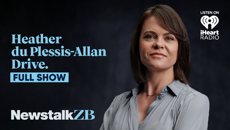The father of a Marist College student who was twice turned away before testing positive for Covid-19 is applauding measures to expand testing criteria and urges any suspect cases to "be persistent".
Geoff Muliaga Brown last night shared a dramatic video on social media describing his nearly two-week battle with Covid-19, that saw him admitted to hospital on Friday.
But despite being severely ill for a week, Muliaga Brown told the Herald he was twice turned away for testing.
"It was awful, the pain was intense, but worse was not knowing what it was."
His daughter attends Marist College, which remains the largest outbreak of Covid-19 cases in New Zealand, with 50 confirmed and probable cases.
The entire school, around 750 students and staff, are now classed as close contacts and have been told to remain in strict self-isolation.
A handful of students from Lynfield College and Mt Albert Grammar are considered casual contacts after riding the school bus with Marist students while they were infectious.
Muliaga Brown said he fell "severely ill" on March 20, about a week after he was an MC at an event at the Catholic girls' school, and the day after a teacher at the school was tested for the virus.
"I started feeling ill during dinner. I went to lie down on the mattress, then that was me, I just felt so run down and tired."
That evening he isolated himself from the rest of his family, but woke at 1am with a severe fever.
"I was cooking. I had to go outside on to the deck to cool off."
A week earlier on March 14 Muliaga Brown had been MC at the school's fiafia night, and believes that could have been when he contracted the coronavirus.
That week there was speculation at the school a teacher had the virus - later confirmed on March 22.
With his symptoms still not subsiding, two days after he fell ill Muliaga Brown took himself down to the pop-up centre in St Lukes, but was turned away as he didn't meet testing criteria that focused on those who had travelled or were close contacts with cases.
Two days later, still "chronically ill", he returned to St Lukes, but was again turned way.
"I had fever, body aches, could barely get out of bed - I knew something was not right. I even mentioned my daughter went to Marist, but was again told I didn't meet the criteria."
Frustrated now, he went home and again phoned Healthline, and was told to try another clinic in Māngere, which agreed to test him.
But by the Friday, Muliaga Brown still had no test results, and his symptoms were worsening.
"I was getting worse, intense pain, fever, short of breath and coughing."
His wife phoned Healthline, which advised to get him to get to a hospital.
He was admitted to Auckland City Hospital that evening, and with the previous test results still not ready he was again tested for Covid-19, which came back positive on the Sunday.
"It was a relief more than anything. I just felt so awful, but even worse was not knowing what it was."
The 48-year-old said he'd had some health issues in the past, and was classed as asthmatic.
"I get bronchitis really bad, and have had some throat issues in the past, but I've been really healthy for a while now. This was just out of nowhere."
He remained in hospital until Tuesday being monitored and given pain relief, and was now in recovery.
He said he wanted to share his story so more people sought out tests, and to encourage the Government to expand its criteria.
"A lot of people might think they just have the flu. I did for a bit, but as I was part of that wider group I started wondering if it was something else."
He was now self-isolating at home, and his wife, daughter and two sons were all being tested. One of his sons previously had symptoms, but these had passed.
Today Health Minister David Clark announced daily testing capacity would increase to 5000 - up from 3750 currently.
It came after Otago University Professor and epidemiologist Sir David Skegg told Parliament's Epidemic Response Committee he believed the testing had been skewed to people who have been overseas, and was therefore a poor indication of community transmission.
Prime Minister Jacinda Ardern later admitted authorities weren't testing widely enough to tell where the community outbreaks were, so the case definition has been expanded.
Travel history and connection with a case was now not essential to being tested.
"I want more tests. We've built the capacity for more tests."
Muliaga Brown said these were good moves, and implored people who suspected they had the virus to be persistent.
"I think the only way to get on top of something is to test, to identify where people are infected and how many and get a better understanding, because we really don't know enough about this virus."
On Wednesday the Ministry of Health announced the number of people in New Zealand confirmed with Covid-19 increased from 600 on Tuesday to 647, with another 61 probable cases.
Take your Radio, Podcasts and Music with you










